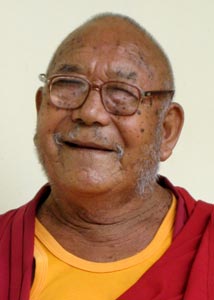Name: Lobsang Lungthok
(Alias: No)
Gender: Male
Interview Age: 87
Date of Birth: 1922
Birthplace: Tunue - Lhasa, Utsang, Tibet
Year Left Tibet: 1959
Profession: Monk
Monk/Nun: Currently
Political Prisoner: No

Interview No.: 21M
Date: 2010-04-10
Language: Tibetan
Location: Doeguling Settlement, Mundgod, Karnataka, India
Categories: Buddhist Traditions
Keywords: childhood memories, Chinese army -- invasion by , escape experiences, festivals, March 10th Uprising, monastic life, refugee in India -- life as, Utsang
Summary:
Lobsang Lungthok was born in Tunuegang, a town very close to Lhasa. His family engaged in farming and he recalls herding the animals. He became a monk at the age of 8 and recounts his life as a monk in the Drepung Monastery in Lhasa. He describes the admittance process and selection of teachers for new monks. As a young man he joined the the dhopdhop--a bunch of obstinate monks who indulged in jumping and throwing stones instead of studying the scriptures.
Lobsang Lungthok provides information on the procedure of the Monlam Chenmo 'Great Prayer Festival' in Lhasa and the various ceremonies and officials associated with it. He explains his own role as a genyok 'assistant' to the tsogchen shengo, who is in charge of discipline during the Monlam Festival where up to 40,000 monks assembled. He shows the tools of the disciplinarian--a sword and a stick, which required that he give up his monk's vows to use.
Lobsang Lungthok speaks about the shelling of the Potala Palace on March 10, 1959 and about witnessing the mass of people fleeing through the swamp near Norbulingka. Fearing the worst, he escaped from Lhasa soon after and relates the difficulties they faced during the journey into exile in India.
Interview Team:
- Marcella Adamski (Interviewer)
- Tenzin Yangchen (Interpreter)
- Pema Tashi (Videographer)

